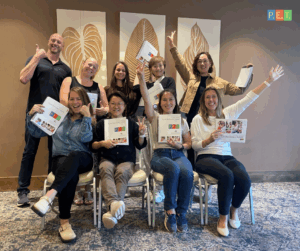“Thank God our kids never got into drugs.”
“Fortunately, our daughter got over her shyness.”
“We were really lucky with both our kids.”
“Our son was always a little rebel.”
“We did everything in the world for those kids—now we barely see them.”
“Our children are pretty good kids – we must have done something right.”
It’s understandable that parents who feel a lack of fate control, who think parenthood is certain to be painful, and who don’t consider their own behavior on their children’s lives might not see the need to take a parenting class.
Like Raymond said in the episode devoted to Parent Effectiveness Training, on the “Everybody Loves Raymond” show: “Taking a parenting class? That’s supposed to come natural…that would be like taking a smelling class.”
As funny as that is, for most jobs in the world, you get training first, right? Why then would that be any different for the most important job in the world? Being a parent.
Since it was first introduced in 1962, there are now millions of parents around the world who have read the P.E.T. book and/or have taken the class—but we continue to hear resistance from many parents who aren’t convinced that they don’t need to learn how to raise their kids.
But take a walk around a grocery store, the local park—anywhere there are kids and parents–and you will hear the power struggles, the threats, the tantrums, the tears—and it comes from the kids, too. Seriously though, it is painful and also sad, to hear the sounds of unhealthy, unhappy relationships, knowing that there is a possible solution. Suggesting that someone take a P.E.T. class can often fall on deaf ears—especially if they’ve not asked for your input, right?
If you took P.E.T., you know what it can do, and you might struggle trying to share the impact it can have, in a way that doesn’t sound like you’re not giving them a sales pitch.
Here is an excerpt from a past speech that Dr. Gordon gave to P.E.T. Instructors that addresses this issue:
“It can be difficult to explain what it’s like to govern a family with the consent of the governed, to share your leadership with all family members rather than act like leadership is the exclusive prerogative of the father or the mother, to relate to your children at the same level rather than from the top of the hierarchy, as in the military.
We can also be more openly assertive about giving parents a vision of a brand-new species of children and youth being created in our democratic families. I’ve met many of these children; and they are truly amazingly different kids:
• Cooperative, not subservient or submissive
• Considerate, not self-centered and thoughtless
• Assertive, not aggressive and abrasive
• Self-confident, not fearful or apprehensive
• Self-directing, not dependent and needing pushing
• Frank, not phony or devious
• Dependable, not unreliable and irresponsible
• Spontaneous, not inhibited and controlled
• Natural, not pretentious or on-stage
• Playful, not grim and grave
• Gentle, not violent or punitive
• Self-respectful, not demeaning and self-effacing
• Affectionate, not cold, remote or undemonstrative
• Good Samaritans, not uncharitable or uncompassionate
I would add to this list some other characteristics which I can’t describe with a single adjective. They, too, are common to the P.E.T. kids I’ve met over the years:
• They make sure their own needs get met, yet are sensitive when others may be affected negatively.
• They are very sensitive to all forms of unfairness they see in their world.
• They treat their friends the way they have been treated at home – they are good listeners, good counselors, good confronters, and good problem-solvers.
• They are mature for their age, yet strangely childlike, fun-loving, playful.
• They want their needs met, yet are unselfish, altruistic and giving to others.
• They have less need of other people – less dependent – yet they have friendships and make friends easily.
• They are less afraid of being laughed at, less afraid of what people will say, less conforming, more individualistic.
• They are more open to their experiences, their inner feelings and their thoughts.
• They are relatively un-frightened by the unknown, and they don’t just cling to the familiar.
• They have a high degree of self-acceptance – accepting the way they are, yet this somehow frees them to change and improve themselves.
I don’t think it is an overstatement at all, when I say that the P.E.T. families are producing a new species of kids. We need to give parents a vision of what kind of kids they can develop.
I’ve come to hold a very strong belief that all groups that govern their members democratically (as opposed to dictatorially) will develop persons who are healthier, happier, brighter, more productive, non-violent, and cooperative.”

